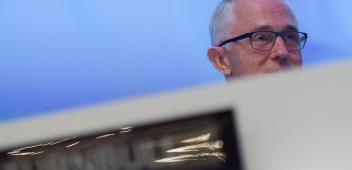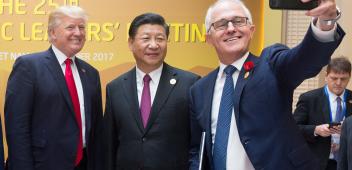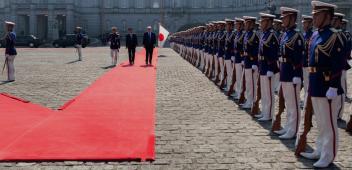After Trump’s phone call, Australians worry about an old alliance
Australians have benefited from the liberal order that the US president wants to dismantle, writes Michael Fullilove in the Financial Times on 4 February. Photo: Getty Images/Andrew Renneisen

It became clear that Donald Trump had altered the tone of US-Australia relations when it emerged last November that the first phone call between the then US president-elect and Australian prime minister Malcolm Turnbull was facilitated by golfer Greg Norman. But reports of a second, 'hostile and charged' phone call between the two men last weekend struck like a lightning bolt on the Australian political scene.
The Washington Post revealed that in the call Mr Trump boasted about his electoral college win and 'blasted' Mr Turnbull over a deal struck between his government and the Obama administration under which the US would accept refugees from Australian detention centres in return for resettling Central American refugees living in Costa Rica.
'This is the worst deal ever,' Mr Trump fumed, before abruptly ending the call 25 minutes into what was expected to be an hour of talks. He later tweeted that he would 'study this dumb deal!'.
It surprised no one to hear that Mr Trump has a poor telephone manner. Australia, however, regards itself as America’s most reliable ally — the only country to fight beside the US in every major conflict of the 20th and 21st centuries.
What are Australians to make of the fact that Mr Trump had a warm hour-long call with Russian president Vladimir Putin — an opponent of the liberal order and an adversary of the US — but he treats our prime minister with disrespect? Even before this tiff, Mr Trump was unpopular with Australians. Lowy Institute polling last year showed that Australians favoured Hillary Clinton over Mr Trump by a ratio of 7 to 1. Almost half of Australian adults said that Australia should distance itself from the US if it elected a president like Mr Trump. Six out of ten Australians said they would be less likely to support military co-operation with the US if Mr Trump were elected. This latest brouhaha will not have improved Mr Trump’s Australian numbers.
The Australia-US alliance will, however, survive the Trump presidency. It has existed for three-quarters of a century because it serves the interests of both countries. For Australia, the alliance provides a security guarantee, as well as intelligence that helps our leaders make sense of the world and interactions with the US military that keep the Australian Defence Force sharp.
But Australian officials will need to recalibrate their approach to alliance management in the Trump era. They will need to apply a discount factor to what Mr Trump says and instead work through other parts of the US system, including the agencies, the military and congressional leaders such as Senator John McCain, who was quick to reaffirm his belief in the alliance.
Australia will also need to prosecute a larger foreign policy. It cannot look at everything through an alliance prism. It needs to strengthen relations with Asian powers such as India, Japan and South Korea and do more with like-minded European partners such as the UK and France, which will supply the next generation of Australian submarines. Australia also needs to defend international institutions, such as the United Nations, towards which Mr Trump is ill-disposed.
Mr Trump’s personality complicates the management of the alliance but the real problem is not his style, it is his world view. He is sympathetic to isolationism whereas Australia relies on an internationalist America. Mr Trump is sceptical of alliances whereas Australians see their alliance with the US as essential. Mr Trump is hostile to free trade whereas Australia is a trading nation. He has a crush on authoritarian leaders such as Mr Putin whereas we are an old democracy and a free society.
Australians are not delicate flowers. We have been known to use rough language from time to time, as the England cricket team can attest. And a tense phone call will quickly be forgotten. Indeed on Friday President Trump tweeted in a conciliatory tone: 'Thank you to Prime Minister of Australia for telling the truth about our very civil conversation that FAKE NEWS media lied about. Very nice!'. The larger concern is that the new US president is an unbeliever in the global liberal order of which Australia is a stakeholder and beneficiary.
Australia’s prime minister placed a call to the leader of the free world last weekend and he got a wrong number.



